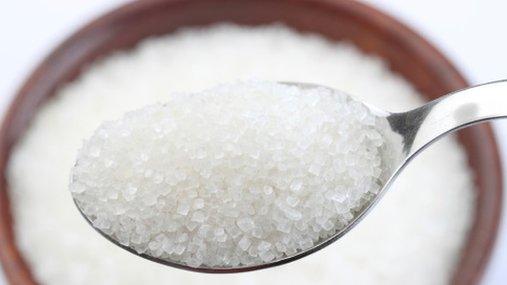How can I cut down on sugar?
- Published
There are growing concerns about sugar and health, as Fergus Walsh reports
Let me confess. I love sugar.
I don't have it in tea or coffee, but I'm partial to biscuits, cakes, sweets and fruit juice, which are packed with the stuff.
I guess I consume way more than the current recommended limit that 10% of my calories should come from added sugar, or the natural sugar in fruit juice.
I am not alone. Every age group in the UK exceeds the current guidelines.
Decay
So halving the sugar limit to 5% is, to say the least, ambitious.
When it comes to tooth decay, added sugar is hard to defend. More than a quarter of five year olds have tooth decay.
But on the wider issue of promoting public health, the new guidelines on sugar are fundamentally about calorie control.
Added sugar is a major source of calories - and given that two thirds of adults and a third of children are overweight or obese - cutting sugar consumption could make a dramatic impact on our waistlines, and the health of the nation.
Obesity raises the risk of heart disease, Type 2 diabetes and many cancers.
Fibre
Sugary drinks deserve special attention, according to Dr Alison Tedstone, chief nutritionist at Public Health England: "There is something special about sugar-sweetened drinks that appears to encourage over-consumption".
Among the 600 studies analysed by the Scientific Advisory Committee on Nutrition (SACN) was research showing an association - but no clear link - between sweet fizzy drinks and the risk of Type 2 diabetes.
It's worth pointing out that the new guidance from the independent panel , externalexcludes the sugar in whole fruit or milk.
So if you cut out added sugar, what should you eat instead?
"We need to reduce sugar intake but should not swap from sugar to fat", said Prof Susan Jebb of the University of Oxford. "A greater proportion of our plate should be fruit and vegetables and more fibre-rich carbohydrates and whole grain."
The draft report from the SACN also recommended that the population increase our daily fibre intake to 30g a day for adults.
Fruit
To do that you need to eat all of the following: five portions of fruit and vegetables, two slices of wholemeal bread, a high fibre breakfast cereal, a baked potato and a portion of whole wheat pasta.
Compare that to added sugar where you can hit your limit simply by drinking a can of fizzy pop.

Health online editor James Gallagher's delicious home-made lemon meringue cupcakes
My colleagues in the health and science unit at the BBC are a friendly bunch who have got into the habit of bringing in cakes and biscuits - many of them home-made.
Barely a day goes by without some calorie and fat-laden goodies being offered.
Today it was those buttery-sweet French cakes known as madeleines. Yesterday there was fruit cake and some suspicious-looking yellow and pink marshmallow biscuits.
Of course if you are active then the odd sugary treat is fine.
After today's report perhaps a switch to some fruit might be an idea.
But offered an apple or a biscuit with my cup of tea, I know it's the latter I'd choose.
- Published26 June 2014

- Published26 June 2014
